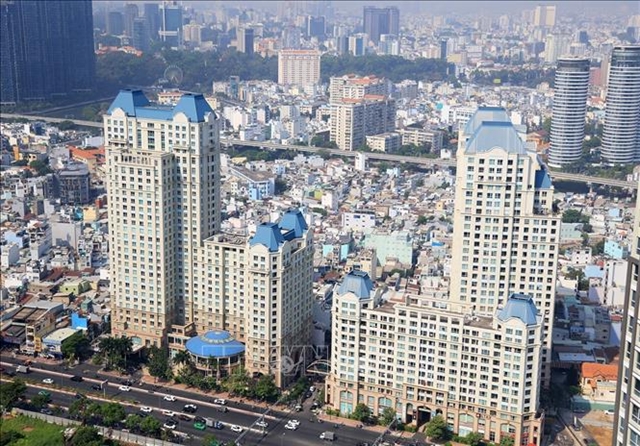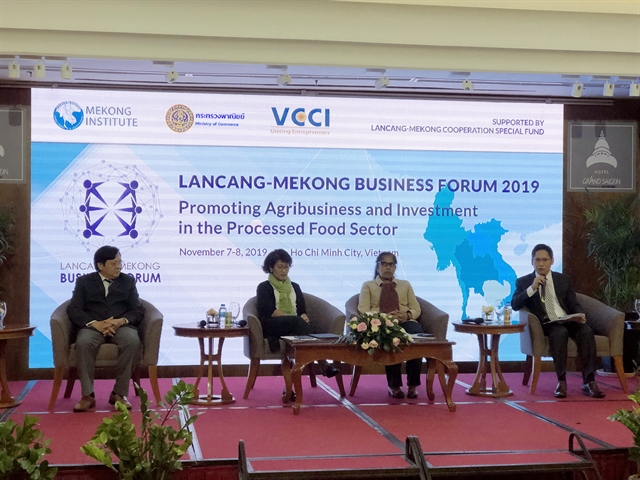 Economy
Economy

Senior officials from government ministries, regional organisations, food processing, and import-export enterprises from the Mekong-Lancang region discussed innovation in the food processing industry at a forum held in HCM City on Thursday.

|
| A panel discussion at the Lancang-Mekong Business Forum held in HCM City on Thursday. — VNS Photo |
HCM CITY — Senior officials from government ministries, regional organisations, food processing, and import-export enterprises from the Mekong-Lancang region discussed innovation in the food processing industry at a forum held in HCM City on Thursday.
The Lancang – Mekong region consists of six countries: Cambodia, China, Laos, Myanmar, Thailand, and Việt Nam.
Speaking at the Lancang-Mekong Business Forum, Apirat Sugondhabhirom, the Thai consul general in HCM City, said: “Food processing and agri-food has emerged as a fast-growing sector in Lancang – Mekong countries as reflected in the forecast of packaged foods and beverages sales in ASEAN to be worth US$164 billion by 2020 compared to $108 billion in 2015.
“Without a doubt, Việt Nam is one of the countries that have witnessed steady growth in the food processing sector of 6-9 per cent.
“HCM City is a case at point with a growth rate of 8.7 per cent in the food processing sector in 2018.”
These reflect the commitment of the Vietnamese Government to supporting policies, especially preferential tax policies, which resulted in the increase of FDI in food and seafood processing and agriculture to $11.2 billion in 2018, he said.
Lê Quý Kha, deputy director general of the Institute of Agricultural Science for Southern Việt Nam, said Việt Nam has diversified its food and agricultural products, and they are exported to 180 countries and territories.
However, the food processing sector in Việt Nam faces challenges, including unstable sources of materials, high post-harvest losses and low value addition due to export of mainly unprocessed products, he said.
The sector seeks to restructure production towards high-quality products meeting international standards, strengthen links between stakeholders involved in the value chain and enhance intensive processing to add value, he said.
According to speakers at the forum, the food processing sector has been a key as well as rapidly changing sector.
There are issues such as changing consumer tastes and preferences, new technologies and innovations to produce, process and preserve food in a sustainable and cost-effective way, environmental and livelihood impacts of the food processing sector, and food security, which shape the sector, they said.
The food processing sector is required to feed a growing as well as ageing population, meet concerns about obesity and the impact of certain kinds of foods on health, the meat industry, disruptive innovations led by start-ups in areas such as plant-based proteins, personalised nutrition, and food technology, they added.
Sugondhabhirom said to further integrate the Mekong-Lancang region into the global food processing supply chain, there is a need to focus on three key areas: capturing the fast changing consumption trends among young and ageing populations and those with special needs or preferences, striking a balance between the agri-food industry, food production and sustainable development and optimising science, technology and innovation into food and beverage production.
“Consumers in the Mekong region, especially Vietnamese, tend to live a healthier and better life than before, therefore they attach great importance to food safety and health-related issues, for example plant-based proteins, personalised nutrition and the use of food technology."
The demand for meat and processed foods has significantly reduced in the west and Asia, and there has been a huge rise in the number of “flexitarians” or people who consume reduced levels of meat products. Data also suggests that people are increasingly moving to vegan diets, he said.
“Second, we must strike a balance between the agri-food industry, food production and sustainable development by maximising the use of resources while taking into consideration the long-term environmental impact.
“Third, optimising science, technology and innovation (STI) into food and beverage production is a must to upscale the agri-product into the global value chain. The STI application would also benefit farmers, be it reduction in agricultural losses, enhanced production efficiency, lower costs, or improvement of profit margins. Extending the shelf life of food products is also possible through innovative packaging that incorporates antimicrobial properties.”
Watacharas Leelawath, executive director, Mekong Institute, said the institute, as part of its partnership with the Ministry of Commerce of Thailand, is implementing a five-year project supported by the Lancang-Mekong Cooperation Special Fund to further drive the growth of small and medium-sized enterprises in the region by organising business forums and related trade promotion events.
The business forum was the second of a series of activities led by the Mekong Institute and the Ministry of Commerce to foster deeper regional cooperation and integration.
Watacharas said in the region the per capita income in the agricultural sector is quite low compared to other sectors, including the services one.
“We want to improve the quality of life of people in the agriculture sector.”
Held by the Ministry of Commerce, Mekong Institute and the Việt Nam Chamber of Commerce and Industry, the forum titled Promoting Agribusiness and Investment in the Processed Food Sector also saw business-matching sessions where over 70 SMEs and investors from the region exchanged information and explored business opportunities.
There was also an exhibition on innovative processed food products. — VNS